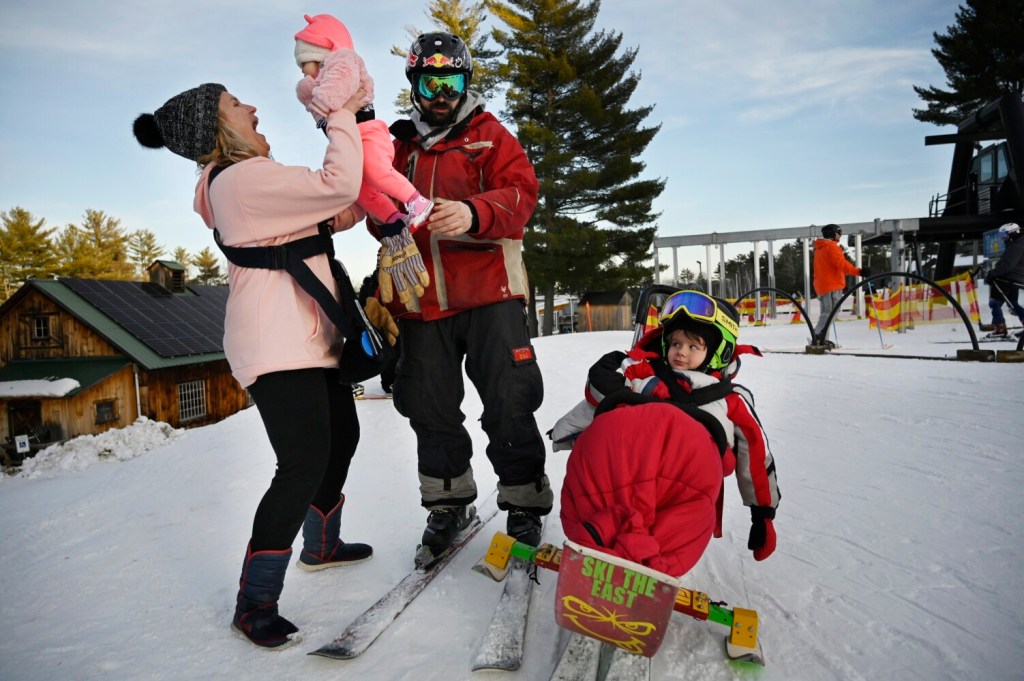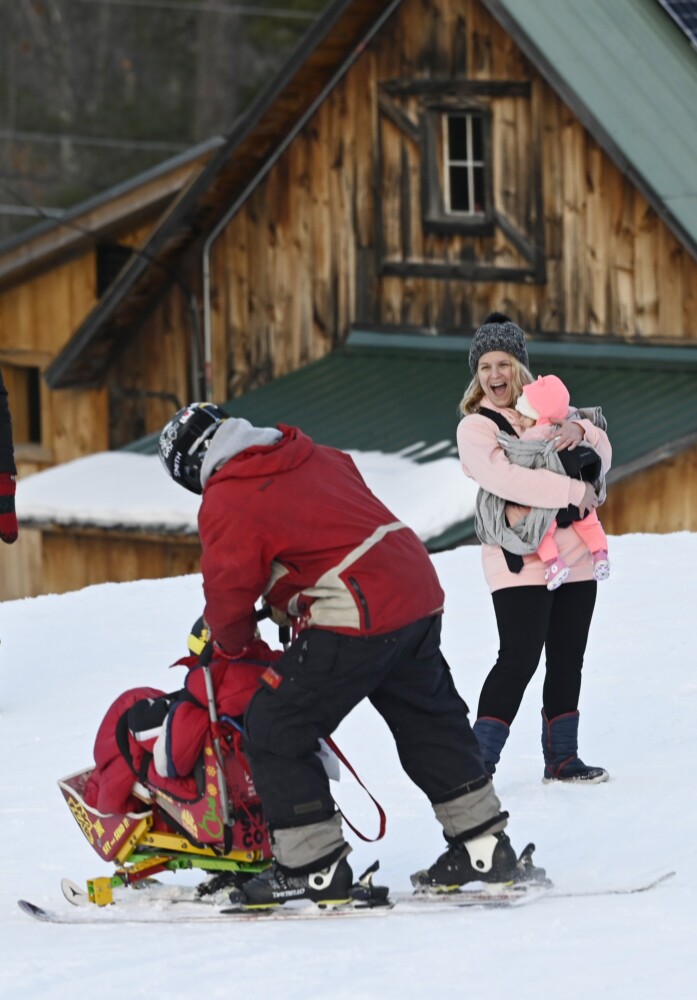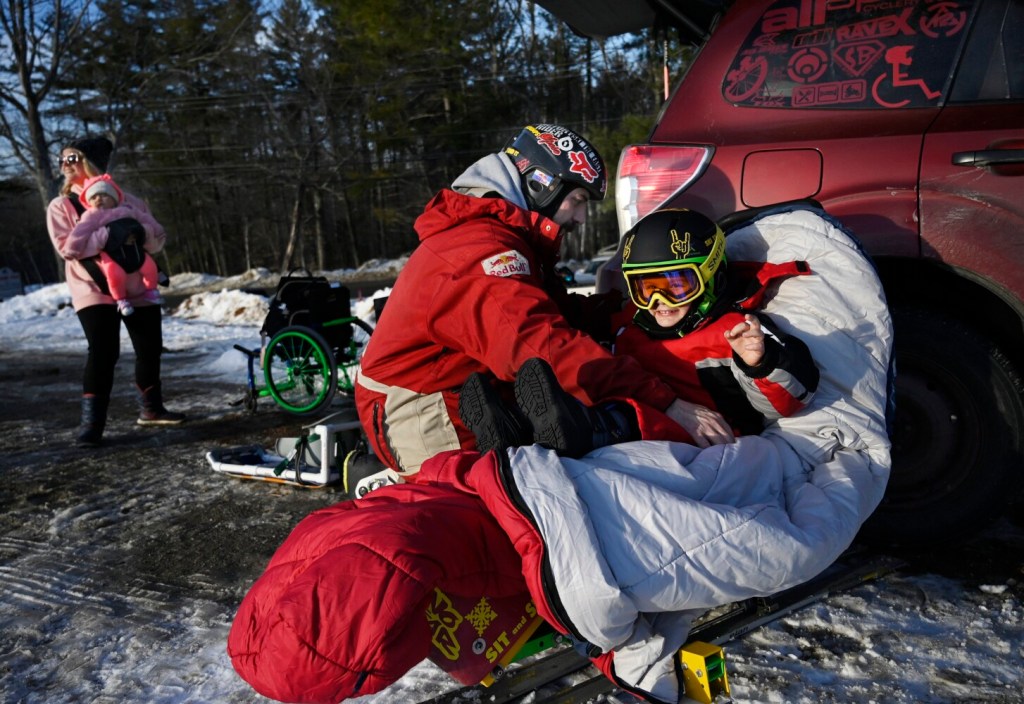BRIDGTON — The small SUV with the cargo box covered with ski stickers looked unmistakably like a car carrying ski bums as it parked just below the Shawnee Peak lifts. With extreme-sports stickers on the tinted windows and Creedence Clearwater Revival audible on the stereo inside, many might assume it was.
But these two skiers from Casco were a far different and unique ski team.
Chad Kilmartin came to Shawnee Peak with his 5-year-old son, Cooper, to teach him how to ski. And while Chad Kilmartin is an expert skier of 30 years, his son’s ski lessons were more challenging than most. Cooper has spina bifida, a condition that occurs when the spine and spinal cord do not form properly. As a result, Cooper cannot move the lower part of his legs.

Kara Kilmartin holding her daughter Delilah, 6 months old, reacts as Chad and Cooper Kilmartin come to the bottom of the mountain after a run at Shawnee Peak. Shawn Patrick Ouellette/Staff Photographer
When Chad and Kara Kilmartin bought their home in Casco in 2016, they specifically chose the lakes district so they could live an outdoor lifestyle and be near a mountain where their children could grow up skiing, as Chad had in upstate New York. When Kara was pregnant with Cooper and they learned their son had spina bifida, they decided to stay the course. Their plan would not change.
“When they tell you your kid has spina bifida, you don’t know what that looks like,” Kara said. “I didn’t know what his life would be like. Now his life is incredible. Spina bifida is a part of who Cooper is – but it doesn’t define who he is.”
Kara and Chad Kilmartin try to make Cooper’s life just as it would be for any other 5-year-old.
As a full-time dietician at Central Maine Medical Center and part-time one at Hannaford, Kara helps balance Cooper’s diet – a necessity since spina bifida can lead to weight gain. As a stay-at-home dad, Chad, who works part-time at Sebago Brewing, helps keep their son active.
Cooper attends preschool in his wheelchair alongside other kids his age. And he lives an outdoor lifestyle year-round. Come summertime, Cooper rides a small ATV his dad retrofitted with a bucket seat and raised foot rests. In winter, in addition to skiing they enjoy ice fishing in an ice shack Chad built with an opening that allows Cooper to easily pop out onto a custom-made sled, which his dad also built.
“Chad is a MacGyver. He can figure out how to build anything,” Kara said.

Chad and Cooper Kilmartin ski together at Shawnee Peak, as Cooper reaches out with his right arm to steer his sit-ski. At age 5, Cooper is just learning to use a sit-ski. Shawn Patrick Ouellette/Staff Photographer
Many people with spina bifida use crutches or walkers to stand, but most require a wheelchair to travel significant distances. Cooper is learning to use a walker with a physical therapist, but primarily uses a wheelchair, one his parents had painted neon green and blue.
And his dad rides right next to him. Chad bought himself a wheelchair to wheel alongside his son.
“Snow and wheelchairs don’t mix,” Kara said. “So they go to Lowe’s and Home Depot and go wheeling around. Cooper has gotten very good at using it.”
Most children with disabilities learn to ski at a formal program, like Maine Adaptive Sports and Recreation, which is based out of Sunday River and offered at Sugarloaf. Other ski areas like Shawnee Peak also have adaptive programs. But two winters ago, when Chad went to Sugarloaf to observe the program there, he was told Cooper, then 3, was too young to join.
“Then COVID hit and everything shut down,” Chad said. “But he was ready.”
The Kilmartins decided not to wait. They saw a child’s used sit-ski for sale in British Columbia, bought it, and had it painted brilliant colors like his wheelchair. They covered it with stickers that speak to Cooper’s can-do spirit, like “No Fear,” “Sit and Send It,” and “SUPER COOPER.”

Chad and Cooper Kilmartin ride the lift at Shawnee Peak. Shawn Patrick Ouellette/Staff Photographer
Last winter, at age 4, Cooper skied for the first time in his sit-ski. After just 10 ski days, he could help turn the heavy sit-ski by leaning and reaching out, while his father skied behind with two straps attached to each side to steady it. The sit-ski has a handlebar on the back so if needed, Chad can push it like a wheelchair.
Two weeks ago, when they got to Shawnee Peak for Cooper’s third ski day this winter, his excitement was obvious in his happy shrieks. When Chad moved him from the car seat to the back Subaru hatch, Cooper sat with his legs dangling and arms pumping.
“He talks all day long about going skiing,” said Kara, who came to watch carrying their 6-month-old daughter, Delilah.
Chad bundled Cooper in a facemask, jacket and beefy pair of boots. Then he added an extra measure of warmth: a down sleeping bag that he wrapped around his son.
“One of the things we struggle with his keeping him warm,” Chad said. “His lower extremities have very poor circulation.”
Chad pushed Cooper’s sit-ski up the short hill to the chairlift 30 yards away from their car, which was parked in one of the ski area’s handicapped spots. Chad clicked into his Alpine skis, looked around the sit-ski at his son’s face, and asked him to list their rules.
“Stay safe. Have fun,” Cooper said, then smiled. “And don’t tell Mommy.”
A beginner sit-ski has a bucket-like seat, a smaller bucket-shaped foot rest, and two long skis on the bottom, beside two smaller skis, that serve as outriggers, similar to an outrigger canoe. The outriggers provide a wide base to steady the sit-ski. But it’s still tippy and requires balance and a strong core.
Cooper has developed both. Now when he turns his ski, he reaches out with one arm in the direction he wants to go.
The next step will be to remove the outrigger skis on the bottom and have Cooper use ski poles attached to blades to help him steer. And one day, Cooper will ski on a mono ski – a sit-ski balanced on a single ski, the kind used by athletes in the Paralympics. He will use outrigger poles to turn, cut and balance.
“His ability will dictate the next step,” Chad said.
For now, at 5 years and 3 months old, Cooper Kilmartin is equal parts tough, chill and optimistic.
“Sometimes he looks around and says, ‘All our friends are here,’ ” Chad Kilmartin said. “We don’t know any of these people. But he already thinks they’re our friends, because we’re all skiing.”
On the way up the chairlift on Feb. 2, Cooper waved to those below. And as the two wound their way down a beginner slope, he waved to an observer when he should have been reaching to steer his sit-ski. The small kindness threw him off his balance, and Chad quickly steadied his ski.
“He regretted that as soon as he did it,” Chad said. “But that’s OK. He’ll learn from it.”
By the end of their fifth run, Cooper was tired and ready to go home. But still smiling, looking around. Back at the lift, he shared with an observer what he loves most about skiing.
“Going fast. And spending time with Daddy.”
Send questions/comments to the editors.











